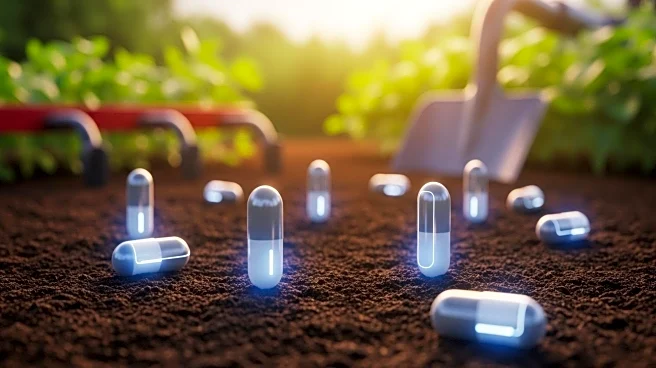What is the story about?
What's Happening?
The global market for nano fertilizers is projected to grow significantly, reaching an estimated value of $8.77 billion by 2033, up from $3.08 billion in 2024. This growth is driven by the demand for efficient nutrient delivery, sustainable agriculture practices, and advancements in nanotechnology. Nano fertilizers offer improved plant absorption and reduced environmental impact compared to traditional fertilizers. They are gaining traction in regions like North America, Europe, and Asia-Pacific, where sustainable farming and agricultural innovation are prioritized.
Why It's Important?
The rise of nano fertilizers represents a shift towards more sustainable agricultural practices, addressing issues such as soil degradation and water pollution. By enhancing nutrient bioavailability and minimizing losses, nano fertilizers contribute to higher crop yields with lower inputs. This efficiency is appealing to both large-scale producers and smallholder farmers seeking environmentally friendly solutions. As global food demand increases, nano fertilizers could play a crucial role in meeting production needs while supporting environmental conservation.
What's Next?
The adoption of nano fertilizers is expected to grow as awareness of their benefits increases among farmers and agribusinesses. Governments may support this transition through agricultural policies and funding for pilot projects. The integration of nano fertilizers with precision farming technologies could further enhance their effectiveness, leading to more efficient resource management. However, challenges such as regulatory uncertainties and farmer education need to be addressed to ensure widespread adoption.
Beyond the Headlines
The development of nano fertilizers highlights the potential of nanotechnology to transform agriculture. It raises questions about the long-term impacts on soil health and ecosystems, necessitating thorough research and regulation. The shift towards nano fertilizers may also influence global agricultural trade, as countries invest in innovative solutions to enhance food security. Ethical considerations regarding the use of nanotechnology in food production may emerge, prompting discussions on safety and sustainability.















